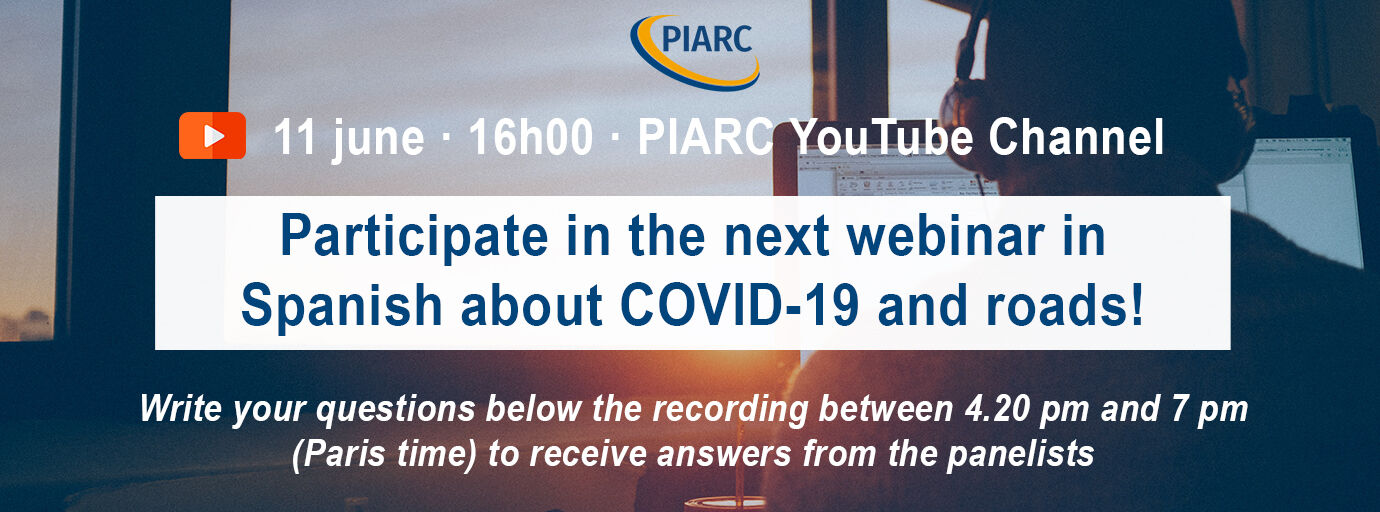Join the next webinar in Spanish about COVID-19 and roads!
11th June 2020
The focus will be on the road sector after the COVID-19 pandemic, how roads can improve the economy, create jobs and fulfill their public service without spreading COVID-19 or any future epidemic, what changes brought by the pandemic will remain in the road sector. Ask your questions to the speakers via YouTube on June 11th at 4pm (Paris time).
The next web seminar in Spanish, lasting approximately 2h30, will focus on the situation of the road sector after the COVID-19 pandemic.
Practical information:
How do I ask questions to the speakers?
- Access the webinar through PIARC's YouTube channel by clicking here on 11 June from 16h (Paris time).
- Write your questions below the recording (to do this you must connect to your YouTube account or create one for free) between 4.20 pm and 7 pm (Paris time) on 11 June.
- Speakers will answer questions in writing below the recording between 4.30pm and 8pm (Paris time) on 11 June.
Program of the webinar
- Welcome and introduction to the Seminar, Eng. Miguel Caso Florez, Technical Director of PIARC (5 minutes).
- Institutional presentation of PIARC, Lic. Marina Domingo Monsonís, Communication Manager of PIARC (3 minutes)
- COVID-19 and roads, Eng. Oscar de Buen Richkarday, former President of PIARC (15 minutes).
- COVID-19 and roads in Dominican Republic, Eng. Euclides Rafael Sánchez Almánzar, Vice Minister of Roads (15 minutes).
- COVID-19 and roads in Ecuador, Eng. Ricardo Paula, Vice Minister of Transportation Infrastructure (15 minutes).
- COVID-19 and roads in Colombia, Eng. Juan Esteban Gil Chavarría, Director of INVIAS (15 minutes).
- COVID-19 and roads in Spain: urban mobility in Madrid, Eng. Susana Magro Andrade, General Subdirector of Mobility Planning and Transport of the Madrid City Council (15 minutes).
- COVID-19 and roads in Chile: road safety during and after the pandemic, Eng. Jaime Campos Canessa, Head of Road Safety, Ministry of Public Works (15 minutes).
- Debate and question time through chat, and answers from the speakers, moderated by Eng. Verónica Arias Espejel, Technical Advisor of PIARC (30 minutes).
- Conclusions of the Seminar, Eng. José Manuel Blanco Segarra, Ministry of Transport, Mobility and Urban Agenda and Spanish-speaking Secretary TC 1.1 PIARC (6 minutes)
- Closing of the Seminar.
COVID-19 - PIARC's response
In an effort to share critical, near real-time information on actions taken by road and transport administrations during this crisis, PIARC is rapidly organizing a series of webinars for practitioners and experts to share their experience, knowledge, and some of the most effective responses to COVID-19. While current practices are not yet fully validated and what works in certain regions of the world may not be valid on a global scale, these shared experiences can be valuable tools in managing this crisis, where a good idea now could save lives, improve the resilience of the economy and employment, and minimize service disruptions now and in the future.
The next Spanish-language webinar, to be held on June 11 and lasting approximately 2h30, will focus on the road sector in the post-COVID-19 pandemic, how roads can improve the economy, create jobs and fulfill their public service without spreading COVID-19 or any future epidemics, what changes brought by the pandemic will remain in the road sector.
